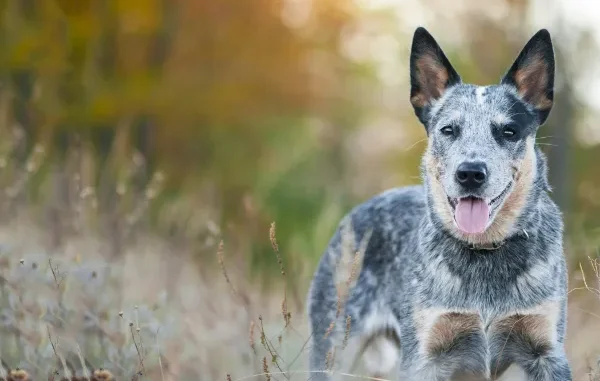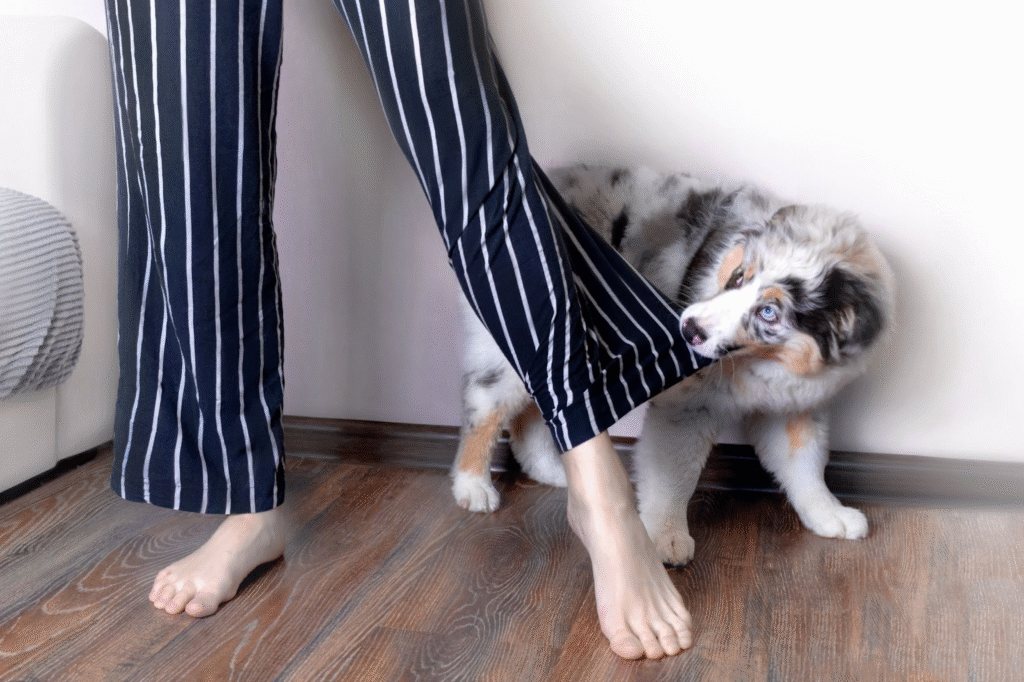

The Australian shepherd puppy is a lively dog who is sure to melt your heart with their adorable looks and fun-loving, adventurous personality. While there’s plenty to love about them, there is one behavior that isn’t quite as cute: Their biting.
Although the Australian shepherd puppy’s teeth aren’t likely to cause serious harm, it’s important to nip this behavior in the bud early before their playful, puppy-sized bites turn into large, adult-sized chomps.
In this post, we’ll discuss exactly how to train an Australian shepherd puppy not to bite. We’ll also briefly touch on why our canine companions love to bite to ensure you’re fully informed.
Why Do Australian Shepherd Puppies Bite?
Biting, to an extent, is a normal behavior for an Australian shepherd puppy. It’s one of the main ways that they explore the world around them! However, they don’t just use their teeth to investigate their surroundings. Here are a few more reasons why Australian shepherd puppies may bite:
- Play: Australian shepherd puppies love to play, and they’ll often playfully bite as a way to express their excitement and encourage others to play with them.
- Herding instincts: Australian shepherd puppies are herding dogs at heart, and they do have a natural instinct to nip and “herd” moving things, including people and other animals.
- Teething: Your Aussie pup’s adult teeth will start to grow in once they’re around 12 to 16 weeks old. While a milestone worth celebrating, it does often leave your pup’s gums sore. Many pups will bite and chew different things (and potentially you) in an effort to relieve this pain.
- Stress: If your Australian shepherd puppy is stressed or their needs aren’t being met, they may try to relieve their anxiety through destructive behaviors, including excessive barking and biting. You may see this within the first few days of buying an Australian shepherd puppy.
- Underlying health issue: Your puppy’s biting may be a sign of an underlying health issue. This is especially the case if they’re biting excessively outside of play, and it’s accompanied by other unusual changes in behavior, like lethargy or appetite loss.
How to Train an Australian Shepherd Puppy Not to Bite
There are a few different measures you can use to train your Australian shepherd puppy not to bite — we’ll briefly touch on some of the most effective techniques below.
Bite Inhibition Training
Australian shepherd puppies naturally nip their mother and littermates while playing. They learn through these interactions how much pressure to apply; if they bite down too hard, their littermates will yelp out of distress to warn them.
You can replicate this behavior yourself once your Australian shepherd puppy has left their littermates. Whenever they bite you, make a loud, high-pitched “ow” sound to show them that they’re biting too hard.
End Playtime With Your Australian Shepherd Puppy
Some Australian shepherd puppies won’t naturally let go after you yelp, especially if they’re excited and riled up. Another effective approach is to teach them that biting will end playtime and won’t elicit any attention from you.
The moment your pup bites, immediately stop interacting with them. Fold your arms, turn away from them, and don’t make any sounds. As soon as they release their grip, you can then shower them in attention once again and reward them with treats and praise.
Redirect Their Chewing
You can help teach your Australian shepherd puppy what’s okay to bite and what isn’t by redirecting their chewing. The moment they’re about to bite you or your belongings, give them a chew toy. You can also make the chew toy more enticing by covering it in a tasty dog-friendly spread like peanut butter.
Over time, your pup will learn the association and start to chew their toys instead of your fingers of their own accord.
Ensure Your Australian Shepherd Puppy’s Needs Are Met
As we briefly mentioned above, Australian shepherd puppies may also bite as a coping mechanism if they’re stressed, bored, or anxious.
As well as actively training them not to bite, it’s also important to ensure you’re meeting their needs properly. Familiarize yourself with the Australian shepherd puppy’s care requirements and be sure to give them plenty of exercise, attention, and mental stimulation throughout the day.
Rule Out Underlying Health Concerns
If you suspect there is something amiss, it’s important to take your Australian shepherd puppy to a veterinarian. They can examine your pup and rule out any underlying health concerns behind their behavior.
How to Train an Australian Shepherd Puppy Not to Bite: The Final Word
Training your Australian shepherd puppy not to bite does take time. However, being consistent, firm, and using our methods above will set them up for success (and keep your fingers safe). You can also work with an organization, like Dog Academy, to both purchase and train an Australian shepherd puppy with their help of their AKC-certified trainers.
As some final advice, make sure to take the time to learn more about the Australian shepherd puppy’s needs. If their biting persists even with consistent training, consult a veterinarian to rule out possible underlying health concerns.
Leave a Reply